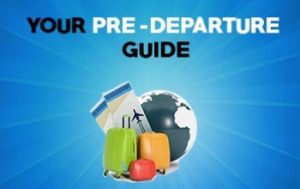You just received your visa and are preparing for your exciting new journey abroad. Questions start popping up in your mind: Who? What? Why? Where? How? Studying abroad or moving abroad is an opportunity that should not be missed. However, preparing for the big adventure can be overwhelming. Before you head off, we thought it important to provide you with a pre-departure guide and advice on how to prepare for your journey.
Everyone’s situation is different, so the information below provides an indication of what you may need to do at various stages – not every item may be relevant to you, but it is best to be as prepared as possible.
DOCUMENTS
Collect and bring original forms of official documents that belong to you and/or the family members who are immigrating with you. Ensure all your documents are in order and make photocopies to pack in your baggage, to leave at home, and send scanned copies to your email address. Carry photocopies of documents of family members who plan on joining you later.
The documents you need to bring include:
- Passport (Make sure it is valid for at least six months after your return date)
- Airline tickets
- Letter of acceptance from your Canadian educational institution
- Key addresses and phone numbers
- A bank statement showing proof of funds
- Letter of invitation from Canadian immigration
- Prescriptions for any medication you are carrying
- Medical and immunization records
- Academic history and university transcripts
- Birth certificate
- Marriage or divorce certificates
- Death certificate for a deceased spouse
- Adoption records for adopted children
- Driver’s license and or International Driving Permit
If the documents are not in the English or French language, you will need to obtain a certified translation for those documents. It is advised to translate documents into the English language. The translation should be done through a reputable agency in your country of origin. If required, documents in English or in French can be translated to French and English, respectively, from within Canada.
Although some of these documents may not be required immediately, it is advised that you carry all your official documents to avoid delays in providing the required documents when needed.
ACCOMODATION
You should know where you will stay when you arrive in Canada and how you will get there from the airport. You should carry local currency for any transit destinations and have enough Canadian currency in cash or traveler’s checks.
BAGGAGE
You should check how much baggage you can take with you and be mindful of weight restrictions and never agree to carry another person’s bags or their items in your luggage. When packing, find out which items are restricted or prohibited for travel to Canada. Canada has restrictions on certain alcoholic beverages, tobacco, firearms, food, animal and plant products, drugs and prescription drugs. Some seemingly harmless goods can be dangerous on board an aircraft and should not be packed in either checked or carry-on baggage. Liquids in carry-on baggage must be in containers less than 100 ml and should be kept in a separate plastic bag, which will be verified during security screening. Remember to clearly tag all your baggage, noting your name and the complete address of your destination in Canada. Also, pack a card inside your luggage with your Canadian contact details. Lastly, remember to keep all important documents, medications and high-value items such as cameras, jewelry, laptops, phones, credit cards and cash in your carry-on luggage.
EMPLOYMENT & EDUCATION
Try to improve your English or French. Communication skills may be the most valuable tool you can possess to settle successfully in Canada and find a good job. The language you focus on improving will depend on which one is most commonly spoken in the area where you have chosen to settle.
Find out the requirements of the study abroad program and University you are interested in applying to and take a note of the deadlines of registering and applying. Ensure that you have all your educational documents, obtain reference letters from your past employers and professors and make sure that your educational certificates and professional qualifications are verified and accepted in Canada.
Find out if your profession is regulated or unregulated in Canada. If you are thinking about living and working in Canada, you need to know about credential recognition. Understanding how your education and work credentials are recognized will help you adapt to life and work in Canada. Foreign credential recognition is the process of verifying that the education, training and job experience you obtained in another country are equivalent to the standards established for Canadian workers.
Qualifying to immigrate to Canada does not mean that your education, work experience and professional credentials are automatically recognized in Canada. Working in some jobs in Canada, including certain trades, may require a license. To get a license, you will need to have your credentials recognized. You can start the credential assessment and recognition process before you arrive in Canada. Getting your credentials recognized takes time and costs money. To facilitate the process of foreign credential recognition, the federal government has a Foreign Credentials Referral Office (FCRO). The FCRO provides information on how you can get your credentials recognized in Canada.
HEALTH CARE
Apply for a government health insurance card. A government health insurance card allows you to receive taxpayer-funded medical care in Canada. You should apply as soon as possible after arriving in Canada.
CIC strongly recommends purchasing private health insurance to pay for your health-care needs until the date when you receive a government issued Health Insurance Card. So, purchase private health insurance to pay for medical costs in case of an emergency, until you obtain government health insurance in Canada.





